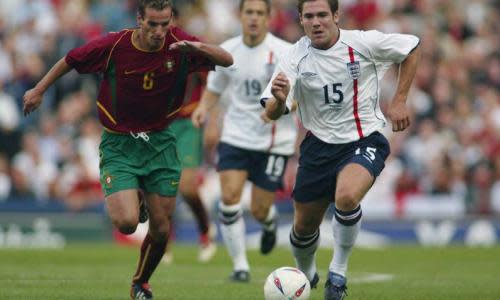David Dunn relishing chance to lead Barrow after 48 years in wilderness
Last week Barrow’s players spent a couple of hours navigating the treetops of Windermere, zip-wiring through the Lake District in the name of team-building, but as the start of the new season moves into full view they are preparing for a League Two adventure after scaling the heights of non-league last season. The manager who led them to the National League title, Ian Evatt, has departed for Bolton but his successor, David Dunn, is determined to carry on where they left off. “Hopefully we can build on what was a fantastic campaign last season,” he says.
For hardy Barrow followers there is a sense they are back where they belong. After controversially being voted out of the Football League in 1972, when a second ballot led to the now-defunct Hereford United taking their place – finances and the Cumbrian club’s remote location at the end of the Furness peninsula facing the Irish Sea are often cited as factors – they were shafted into the wilderness and for years yo-yoed around the fifth and sixth tiers. It is apt then that a vote ultimately led them back to the league, with Barrow named champions after a points-per-game system determined the final standings.
Related: David Dunn appointed as manager of Football League returnee Barrow
Barrow was Evatt’s first managerial post and, despite Dunn spending four months in charge of Oldham in League One, initially as a player-manager, he says this feels like his first “proper go” at a top job. Dunn joined Barrow from Blackpool, where he was first-team coach, a role he previously held under Tony Mowbray at Blackburn Rovers, where he started his playing career and worked in the academy after retiring.
“I had a bad taste in the back of my mouth after the Oldham one but I’ve really enjoyed coaching for the last three or four years and when the opportunity arose, I thought it’s something I needed to do,” he says. “I feel totally different now. I was inexperienced. Looking back at it, in my time there, I wasn’t ready. But now I think my experience from coaching at different levels will stand me in good stead.”
First is a trip to Derby in the Carabao Cup on Saturday. It would have been the perfect tie for the former Barrow captain John Rooney, Wayne’s younger brother who departed for Stockport in the summer, but, regardless, it is arguably the pick of the first round. “I’m sure the players will be thinking they want to be on the same pitch as Wayne, to test themselves against a top, top player. It has come around quickly but it is a great occasion for the players and myself.”

Dunn made almost 400 league appearances for Blackburn and Birmingham – the majority in the Premier League – and acknowledges he could hardly have had a better coaching education given he played for Sam Allardyce, Mark Hughes, Steve Bruce and Graeme Souness, who have taken charge of almost 3,500 games between them.
“I’m sure if I needed their advice, they would be there for me. I really enjoyed my time with Big Sam. People say he is a long-ball manager but it’s nonsense. Sam always encouraged you to make the right decisions at the right time. Sometimes you might have to put your foot through it but he also encouraged you to play as well. He was way ahead of his time in terms of sports science. I remember once he had me doing altitude training and we would take home this breathing apparatus. He was always one of the pioneers of trying to get that little edge.”
Related: Barrow back in Football League thanks to miracle man Ian Evatt | Louise Taylor
Dunn won promotion to the top flight in 2001 and lifted the League Cup a year later playing for Souness, before earning a solitary England cap after replacing Steven Gerrard against Portugal in September 2002, around the era of the so-called “golden generation”. On the opposite team that day was Nuno Gomes, who later became a teammate at Blackburn. “England had some fantastic players at the time and probably should have won something. I’m disappointed I only got one cap but it was difficult to get in front of a lot of very good players. Could I have been a little bit more dedicated to give myself the best chance to perform? Maybe.”
Barrow train in Rochdale, a couple of hours south, in order to make the club more attractive to players and Dunn has beefed up the squad with eight signings, including the former Carlisle midfielder Mike Jones, with whom he played at Oldham, and the striker Luke James, who had a fruitful loan at the club in 2017-18. Off the pitch they have been busy bringing their 111-year-old stadium up to scratch, adding a roof to the Holker Street End previously open to the elements.
Under Evatt, a front-foot style led supporters to nickname them Barrowcelona but Dunn’s focus is on ensuring they are competitive in the league after 48 years away. For an industrial town renowned for its shipbuilding heritage, it is almost time to sink or swim. “We would all like to play really attractive football but I’m not naive enough to think we can do that all the time because at times you need to mix the game up,” he says. “First and foremost you want to play winning football. I’m not here to change loads of stuff but to carry on and try and make the players better.”

 Yahoo Sport
Yahoo Sport 





































